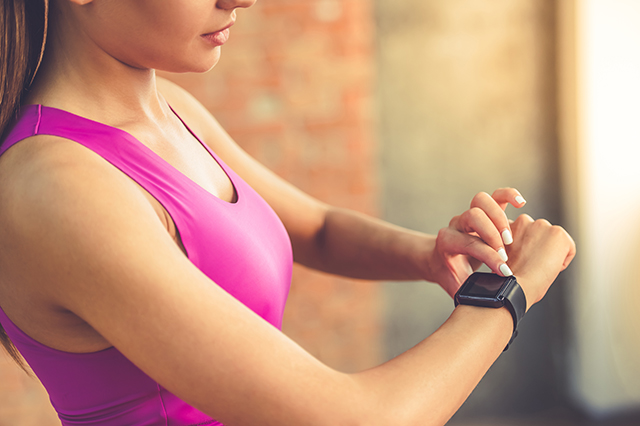Our relationship with technology is constantly changing. We’ve gone from using our gadgets for simple tasks, like making phone calls and checking the weather, to sharing information with our devices. One of the latest technology trends, wearables, has left the world heading towards a very futuristic reality. While earlier designs simply tracked your steps and heart rate, the newest models of smartwatches, FitBits and fitness trackers can do much more, including tracking your caloric expenditure, sleep cycles and oxygen levels.
Whether you’re an athlete or not, these monitoring functions can be very beneficial and useful. If you’re looking to track and improve your overall health, here are some of the best fitness trackers on the market.
Best fitness tracker for the price: Garmin vivosmart HR+
One of the best fitness trackers available now, Garmin vivosmart HR+ features a wide range of useful (and accurate) features! To start, the wide touchscreen display is easy to read at a glance outdoors, which is a huge step up from some other available models. This means less fiddling with your phone during those long runs. Including a 5-day battery, a heart rate sensor, GPS tracking, automatic activity recognition, call/text notification alerts and a waterproof rating of up to 50 meters, this fitness tracker gives you a great bang for your buck. It’s the perfect workout mate!
$179.99
Best fitness tracker for sleep: Fitbit Alta HR
Featuring a wide range of interchangeable straps, the Alta HR is a great option for those who like to switch things up. But, that’s not what makes this fitness tracker so great. Focusing on functions that track sleep and heart health, this device aims to help users monitor their overall well-being. The built-in heart rate sensor can track your burned calories, even during non-step exercises like yoga and spinning. However, the sleep functions are what really make this a smart purchase. Featuring Sleep Stages and Sleep Insights, the Alta HR can do everything from estimating the amount of time you spend in light, deep and REM sleep, to providing personalized guidance on how to catch some better z’s.
$149.95
Best fitness tracker for style and function: Withings Activite Pop
A new trend in wearables is emerging – mixing fitness with fashion! And many fitness trackers are getting an overhaul to incorporate sleeker, suaver designs. The Withings Activite Pop does this pretty effectively, providing all the functionality of a tracker in the discreet design of an analog watch. Users can tell when they’ve reached their step goals for the day by glancing at a sub-dial on the face. One full revolution of the hand means you’ve hit 100 percent! The device features replaceable rubber bands, tracks sleep, is water resistant up to 30 meters, provides Bluetooth connectivity and has an eight-month battery life. A newer (and equally amazing) model of this fitness tracker, Nokia Steel, is now available.
$58

Best fitness tracker for discreetness: Motiv Ring
Clunky designs and complicated controls have left many people hesitant about joining the wearables bandwagon. But the Motiv ring, which crams all the functionality of a tracker into its slender, titanium alloy frame, is exactly what some of us have been waiting for. It’s the perfect solution for those who want all the benefits of a fitness tracker without the awkwardness. The ring will be able to track steps, calories, distance and heart rate, with a battery life of up to 3-5 days on a single charge. Plus, it’s waterproof up to 50 meters (a huge bonus for swimmers). The Motiv Ring is currently available on iOS.
$199
Fitness trackers have evolved from counting steps to tracking REM sleep and more. And some devices have even detoured from the traditional fitness-oriented design to venture into areas of mental health. The Fitbit Blaze and Fitbit Charge 2 both feature a breathing tool called Relax designed specifically to help wearers de-stress. And more devices like this are on the way.
No matter what new capabilities wearable tech of the future may hold, one thing is certain: models will become smaller and sleeker while getting more advanced, powerful and intuitive. And as our technology continues to get smarter and increasingly more connected, consumers will have the unique opportunity to take personal health into their own hands.
Have fitness trackers improved your health? Tell us your story in the comments below.












